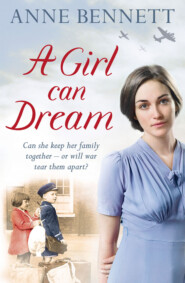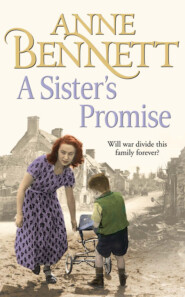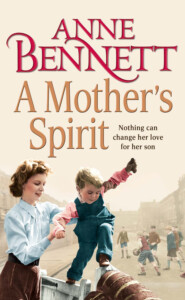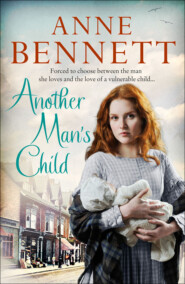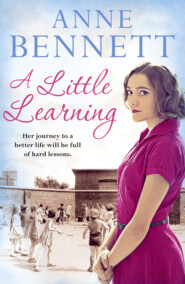По всем вопросам обращайтесь на: info@litportal.ru
(©) 2003-2024.
✖
Love Me Tender
Автор
Год написания книги
2019
Настройки чтения
Размер шрифта
Высота строк
Поля
Lizzie wished the priests were like her father, for she imagined that when she told it in confession – because she knew she’d have to tell – they’d take a very dim view of it altogether.
Downstairs, Barry explained to Kathy what the row had been about.
‘Oh, how I hated to smack her,’ Kathy said, ‘and in front of that woman too, but I had to do something. Lizzie admitted hitting the child. If it had been anyone else it wouldn’t have mattered so much.’
‘It wouldn’t happen to anyone else. No one gets our Lizzie going like Sheelagh,’ Barry said. ‘And the child’s got a tongue on her like her mother, but our Lizzie’s sorry now.’
A little later, when Kathy took Danny to bed, she said to Lizzie, ‘Daddy’s told me all about it and we’ll say no more. I’m pleased you’re sorry for what you did. I want you to try not to be such a bold girl in future, will you do that?’
‘Yes, Mammy,’ Lizzie said, and was glad of the dimness of the room that hid her smile.
Czechoslovakia was suddenly the name on everyone’s lips, and some of the family and neighbours came round to the O’Malley house each evening now to listen to the news. Even easy-going Pat and his father, Eamonn, had begun to realise there was reason for concern, as had Michael, now a good friend of Barry’s. Sean was the last of the men in the family to become aware that things were serious, but then his energies and worries were with his wife, Rose, who’d given birth to a little girl in mid-August but hadn’t seemed to pick up as she should have done.
The children were back at school when the news came through about Hitler demanding control of the Sudeten area of Czechoslovakia. He claimed that three and half million German-speaking people there were being discriminated against by the Czech government. Kathy and Barry were by themselves early one evening, and Barry read the news out of the paper as Kathy sat knitting for the new baby, due in November.
‘He might be satisfied with that, then?’ Kathy asked hopefully, but she sensed Barry’s unease.
He gave a grunt of disgust. ‘Satisfied?’ he repeated. ‘He’ll not be happy till he has the whole of Europe. I don’t believe a thing the bugger says, Kathy, and neither should anyone with any sense.’
Chamberlain didn’t share Barry’s views and prevailed on the Czech government to make concessions to prevent a German invasion. When Chamberlain and the French prime minister, Daladier, met with Hitler in Munich on 29 September 1938, they agreed to Germany occupying the Sudetenland after guaranteeing the rest of Czechoslovakia safe from attack.
As Chamberlain arrived back waving his piece of paper and declaring, ‘I believe it is peace for our time,’ many were lulled into a false sense of security that war had been averted. Barry was not one of them.
However, he hadn’t time to worry about it much, for in October, six weeks early, Kathy gave birth to a little boy. He was baptised Seamus and lived only for four days. Kathy was inconsolable for some time and her mother took over caring for her and Barry, as well as the children.
Mary, worried as she was about Kathy, was worried still further by Sean and Rose and their wee girl, Nuala. Then there was Maggie, who, seeing the advantage of her mother’s time and energy being diverted elsewhere, was out till all hours and probably up to God alone knows what mischief with Con Murray.
Only Bridie seemed unaffected by anything. ‘You’d think she’d help a bit,’ Mary complained angrily to Eamonn one night. ‘After all, the weans are off her hands at school all day, and yet never a hand’s turn does she do for anybody.’
‘Ah well, sure, that’s Bridie for you.’
And that was Bridie, that was the trouble, concerned only for her own welfare and that of her children. She was jealous of Kathy and Barry and always had been, and it was all because of their house. Pat and Bridie lived in a communal courtyard, criss-crossed with washing lines. The yard also housed the dustbins, shared toilets and the brew or wash house. Kathy and Barry’s house, on the other hand, opened on to the street, and had two doors, the second one on to the entry that led to the yard Bridie lived in. It had a large cellar lit with gas mantles and a huge white sink underneath a grating with a cold water tap. That tap meant Kathy could do her own washing in her own house. She even had a gas boiler beside the sink to boil the whites, and there was still plenty of room to get the bath down from the hook on the back of the door and fill it up for the children’s weekly bath.
Mary thought them lucky to have the house, but she imagined they’d more than earned it. After their marriage they had lodged there with Barry’s gran, who was the tenant. No sooner were they in than the old lady, seeing someone there to fetch and carry for her, took to her bed, and Kathy had a time of it, especially when she was expecting Lizzie.
Then the old lady became senile and began accusing Kathy of trying to poison her, and yet Kathy didn’t lose patience, telling Mary she was just an old lady terrified of being put in the workhouse. When they got the house afterwards, Mary was pleased for them and Kathy said that in many ways she missed the old lady. Bridie, though, could never be happy for someone else’s good fortune.
Mary sighed. Pat really deserved a medal for putting up with it all the way he did, but just now her energies had to go to Kathy, for the baby’s death had knocked her badly and it was beginning to affect the whole family.
Kathy wouldn’t even go to the bonfire down the yard on Guy Fawkes night, but sat huddled over the fire as if she were cold. She said she didn’t feel up to it. In the end Eamonn went out and bought fireworks for the weans and Mary cooked the sausages to share, as was the custom, and Barry went down to keep an eye on the weans and let off the fireworks.
When they returned, they were sticky, smoke-grimed and tired, but happier than they’d been since their little brother had died. Mary, who’d been keeping Kathy company, decided the time had come for a straight talk with her daughter. When the weans were tucked in bed and Barry dispatched to the pub with the men, she began. ‘Kathy, you can’t grieve forever, love. God knows it’s hard, pet, but you have two other weans to see to.’
‘Lord, don’t I know it!’ Kathy cried. ‘But Mammy, I can’t.’
‘You can and you must,’ Mary said firmly. ‘The weans miss you.’
‘Sure, they have me.’ But they hadn’t, and Kathy knew that as well as her mother. They had a shadow of their old mammy, one with no substance and no life. And as for Barry, as far as Kathy was concerned, he might as well not have existed.
Kathy did try, but it was not until after the start of 1939 that she began to feel anything like herself. Even then she avoided Rose, as looking at the chubby, smiling Nuala was like a dagger in her heart. Danny began school in January, although he wasn’t five until March. She’d hadn’t even to leave him at the school, or collect him. ‘Lizzie’s well able to take him,’ Mary said firmly, and she was right. Lizzie, now turned seven and a half, was proud to take her young brother along Bristol Street and into Bow Street, where the school was.
While the O’Malleys were coming to terms with the loss of their child, the Czechs were just beginning to realise that in agreeing to Hitler’s demands, they had lost seventy per cent of their heavy industry. Slovakia, feeling let down by their government, demanded semi-independence. Fearing a revolt, and with the country in total disarray, President Hacha requested Germany’s help ‘to restore order’. German troops took possession of Czechoslovakia in March 1939. Britain and France complained, but did nothing; Hitler claimed he’d not invaded but been invited in, and turned his attention to Poland and, in particular, the city of Danzig.
Every night Barry would listen to the news reports, usually with Pat, often with young Michael and occasionally with Sean too. For a long time they’d discuss the news items together before dispersing.
No one now tried to convince themselves that the world wasn’t at crisis point. Barry and Michael had been making anti-tank rifles, and now they’d been put on to making Browning 303 machine guns. No one objected to the long hours put in; everyone seemed to realise it was a race against time, and there was a sense of inevitability during the spring and summer of that year.
The summer holidays dawned wet, miserable and dull, but when July gave way to August there was a heat wave and the temperatures were sometimes the highest they’d been for thirty years. ‘I wish we could go to the seaside,’ Lizzie complained one day to Carmel, who agreed. They’d never been but had heard it was grand.
The pavements seemed to radiate the heat, so that it shimmered above them and they were dustier than ever. Lizzie sat on the step and watched three little boys building dust castles, which they then destroyed with their toy cars, making a great deal of noise about it. Others huddled in groups over piles of marbles. One little girl, younger than Lizzie, pushed a pram with a fractious baby inside, while a bit further down the street, two older girls wielded a long, heavy rope while another girl skipped inside the loop. Lizzie wondered how they could be so energetic. She was so hot, her clothes were sticking to her body. ‘If we went to Cannon Hill Park, we could paddle at the sides of the lake,’ she suggested. ‘If Mammy would let us.’
‘We’d have to take Sheelagh and Matt too, at least,’ Carmel said.
‘Couldn’t we go on our own just once?’
‘You know full well we couldn’t.’ Carmel was older and wiser than her niece. ‘Sure, Bridie would play war if she found out.’
Suddenly Lizzie wasn’t sure if she wanted to go, and have Sheelagh goading and sneering at her. She wasn’t sure whether it wasn’t a better prospect to stay in the hot street and swelter. But in the end she went, and her mammy and Auntie Rose went too.
Kathy was also feeling restless and unsettled and a day out with the children was maybe just what she needed. Also she thought she’d ignored Rose’s baby daughter long enough; sure, it wasn’t Rose or Sean’s fault her baby had died.
They sat on a grassy incline overlooking the lake and watched the ducks and swans swimming between the circling rowing boats. The children had stripped to the bare minimum, as had many others, and were squealing and giggling as they played together. Nuala was practising the new art of walking and now and again would tumble over and chuckle to herself.
‘It’s hard to believe dreadful things are going on in other parts of the world on a day like this,’ Kathy remarked.
‘I know Sean’s really worried. Is Barry?’
‘Everyone’s worried. God, Rose, what if war comes and our husbands are called up and there are enemy planes in the sky?’
‘You don’t think it can be averted?’
‘Not now, it’s too late,’ Kathy said. ‘We heard it on the news, Hitler wants the town of Danzig, and if it’s given up to German control he has a corridor straight through to Prussia, cutting off Poland’s access to the sea. I don’t see them agreeing to it, do you?’
Rose shook her head sadly. She looked at her little boy Pete, now a sturdy three-year-old, and Nuala still a baby, and shivered, and yet she believed her sister-in-law. Sean said Barry had a better grasp of the world situation than many of the politicians, which came from all the reading he’d done while he was on the dole.
It was as the women and children made their way home that they came upon men digging trenches. ‘What are they doing?’ Danny asked.
Rose and Kathy exchanged glances. Everyone was aware of the policy of digging trenches in parks and other open spaces; it had been on the news, but to actually see it being done was dreadful.
‘What will they have us do? Cower in the mud like rats?’ Bridie had said scathingly.
‘Well, it will surely be better than nothing if you’re caught in a raid,’ Pat had retorted.
Kathy knew her brother was right and, as war was inevitable, and everyone knew that this time civilians everywhere would be targeted too, she should have felt reassured seeing the trenches being dug. Instead it filled her with dread. But she had to answer her small son. ‘They’re just digging,’ she said shortly.
Danny walked to the rim of the trench to look in. The two men digging were stripped to the waist, their backs gleaming with sweat. One of them grinned up at him and all the children began edging forward to see.
‘Come on now,’ Kathy snapped.






